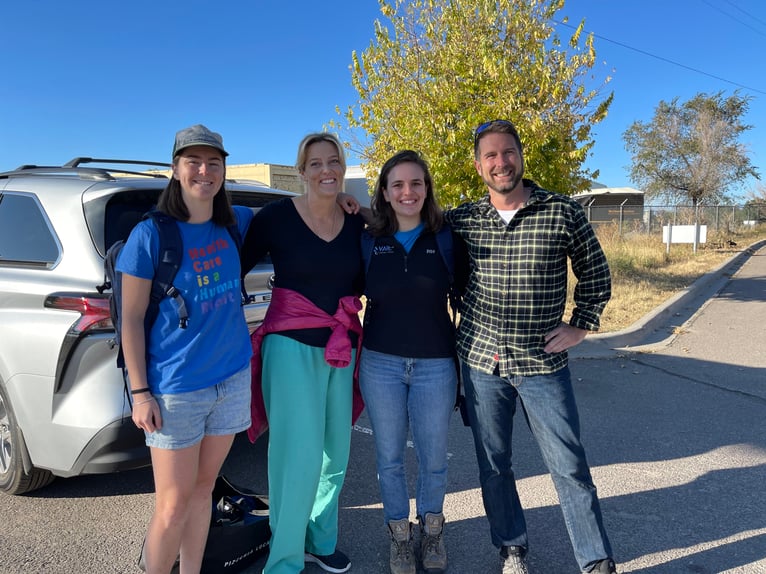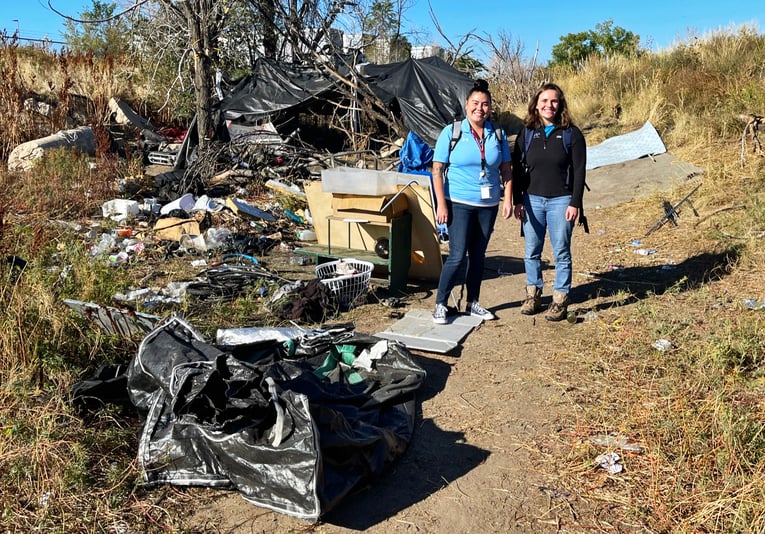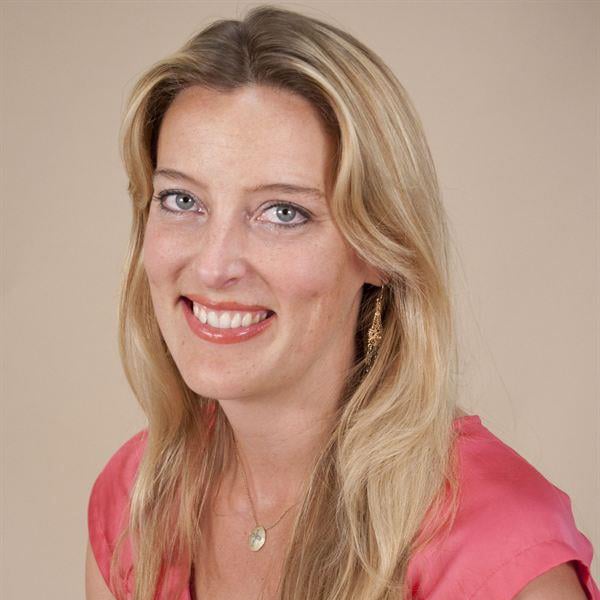Patient care doesn’t always happen within four walls or in buildings with controlled climates and cupboards full of supplies. Sometimes it happens in a parking lot, on the sidewalk, by a trail – wherever a person with need happens to be.
It’s an essential lesson that Rebecca Henkind, a second-year student at the University of Colorado School of Medicine, and Kiera Connelly, who in December will graduate from the University of Colorado College of Nursing, learned while working at the Colorado Coalition for the Homeless (CCH).
That lesson and others they learned working with CCH inspired them to form CU Street Medicine, a new student interest group that connects medical, nursing, and other interested students on the CU Anschutz Medical Campus with community partners who offer medical and non-clinical services to people experiencing homelessness or housing insecurity.
“Something Kiera and I both learned (working with CCH) is how important it is to meet people where they’re at, and that the need is huge,” Henkind explains. “We wanted a way to help students have opportunities to work with people experiencing homelessness and gain experience giving the care that people actually need, and not just what we think they need.”
Building community partnerships
Henkind and Connelly, both EMTs, not only met while working with CCH, but became friends. Through shared experiences in the CCH clinic and with the Health Outreach Program held outside shelters throughout Denver, including on Monday evenings outside the Denver Rescue Mission, the one at which they worked.They gained an expanded awareness of not just the medical needs that people experiencing homelessness may have, but the many other challenges that can affect their ability to access and receive care.
“It was issues that I don’t think there’s a lot of awareness about,” Connelly explains. “Things like trying to get transportation to pick up a prescription, or avoiding picking it up because of copays, being able to get an ID without an address, and just a general erosion of trust in the system. So much that impacts health care isn’t about the actual medical care.”
Henkind and Connelly reached out to Kathryn Boyd-Trull, MD, an assistant professor of family medicine, and to Scott Harpin, PhD, RN, an associate professor of clinical teaching in the CU College of Nursing, for mentorship. In 2014, Boyd-Trull founded the Yahweh Health Clinic to provide medical services to people experiencing homelessness or who are housing insecure.

The CU Street Medicine team includes, from left, Kiera Connelly, Kathryn Boyd-Trull, MD, Rebecca Henkind, and Scott Harpin, PhD
“I grew up in rural Colorado, and with the population surrounding me in the rural communities, I was seeing just a lot of barriers to care,” Boyd-Trull explains. “It wasn’t even that the people I was seeing were actually homeless, they were working, but with limited resources and limited access to care. I was seeing that a huge percentage of our population wasn’t actually getting care, and in fact wasn’t even seeking it out.”
Also, Henkind and Connelly reached out to Sarah Nachtman, a community navigator with the City of Commerce City, and began accompanying her at least once a week on outreach visits to areas of Commerce City where people experiencing homelessness are staying.
“This is a really important partnership,” Nachtman says. “A big part of getting services to people experiencing homelessness or who are housing insecure is meeting them where they’re at and starting to rebuild the trust that a lot of people have lost because of their previous experiences.”

Sarah Nachtman, left, and Rebecca Henkind
Hands-on medical and advocacy opportunities
Working closely with Boyd-Trull, Harpin, and Nachtman, the students began shaping what a street medicine student interest organization could be, drawing guidance from the Street Medicine Institute. They applied for and received a competitive grant from the Street Medicine Institute and have consulted with Jim Withers, MD, considered the "father of street medicine," and Brett Feldman, both leaders in the field of street medicine. Withers and Feldman held grand rounds with the CU Center for Interprofessional Practice and Education and, while in Colorado, went on outreach visits with the CU Street Medicine organizers and community partners.
Henkind and Connelly also worked in partnership with the CU School of Medicine and College of Nursing administration, talked with their fellow students about the education they were receiving on working with people experiencing homelessness, gauged interest, and presented to community organizations, including the Commerce City Police Department (CCPD).
“When they presented their proposal to the police department, PD was excited to make the connection," Nachtman says. "They understood that providing street medicine was an important step in establishing our community partnership."
As a student organization, CU Street Medicine serves as a nexus of information and resources. Students interested in medical outreach are connected with Yahweh Health Clinic and those interested in non-clinical services are referred to Nachtman for hands-on volunteer and advocacy opportunities.
Students who volunteer with Yahweh Health Clinic or the City of Commerce City learn about giving trauma-informed care, “based on the idea that everyone we work with has experienced some sort of trauma, and that may cause them to respond to things in certain ways that may not be your way of responding to things, and that’s OK,” Nachtman explains.
“One of the reasons our partnership with Sarah is so important is because students are able to go out with her one-on-one and it’s almost like private tutoring,” Connelly says. “Should someone react to something in a way that (the student) isn’t used to, Sarah can walk them through why they might have reacted that way, because she has long-standing relationships, she’s worked hard to rebuild that trust.”
The opportunities that CU Street Medicine is able to help students access is important, Boyd-Trull says, because students may have a desire to provide care to people experiencing homelessness or housing insecurity, but may not have a clear picture of what that care can entail.
“The thing we’re asking is how do we create real, meaningful change for this population?” Boyd-Trull says. “How do we set this up so more and more people can be aware and see these needs as real things that are happening every day in our communities? Even if somebody goes out for a one-time visit, it will change the way they practice health care.
“I think the important thing to learn is just being present and meeting people where they’re at. I’ve had people go out with me and say they hadn’t considered some of the need they saw, maybe just the simple things – a person is dehydrated, they need water, or they haven’t eaten for three days and are scared to leave their tent because they don’t want to get robbed. A lot of times, the need is for something as simple as kindness, so the humanism piece is such an important part of medical education. We’re not going to solve every health care problem known to man, but it all starts with caring.”
“We can’t understand until we’ve really listened”
Both Henkind and Connelly say their experience organizing CU Street Medicine and working with people experiencing homelessness and housing insecurity has had a significant impact on the sort of health care they want to practice.
“For me, it’s really shed light on how traumatizing our health care system can be and how insensitive it can be to people’s living situations,” Connelly says. “I think about things like people getting discharged from the emergency department in the middle of the night, and maybe their tent got swept so they try to hang out in the lobby and get fined for trespassing. And discharge planning is just one small part of the health care system that doesn’t necessarily serve or benefit this population.”
For Henkind, working in street medicine has taught her to not “make assumptions, because there’s always more to the story,” she explains. “It’s so easy for a medical provider to label a person as non-compliant, but we may not even know whether they have a safe place to keep their medications where it won’t get stolen, or they may not have transportation, or the fear and uncertainty of their situation may have contributed to them developing mental health issues. We can’t understand until we’ve really listened.”




